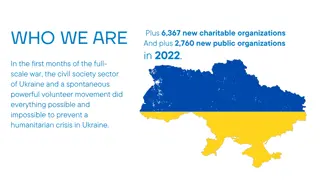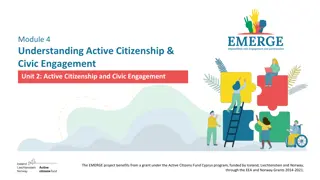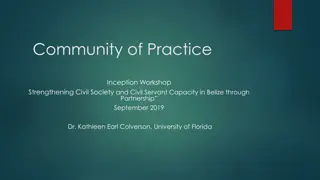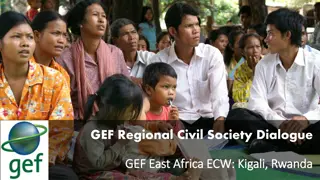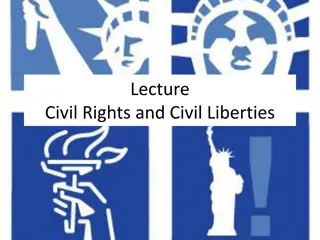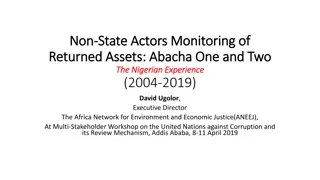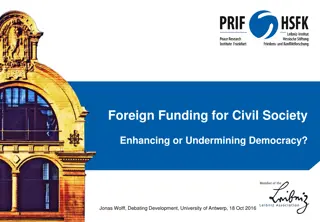Understanding Civil Society: Definitions and Perspectives
Civil society refers to a realm of social life distinct from the state and the market, characterized by voluntary collective actions centered around shared interests, values, and purposes. It encompasses a wide range of formal and informal organizations, social movements, NGOs, faith-based groups, and community-based initiatives. Various perspectives from institutions like the United Nations Development Program, the London School of Economics, John Keane, Civicus, and Johns Hopkins University shed light on the diverse spaces, actors, and institutional forms within civil society.
Uploaded on Dec 06, 2024 | 0 Views
Download Presentation

Please find below an Image/Link to download the presentation.
The content on the website is provided AS IS for your information and personal use only. It may not be sold, licensed, or shared on other websites without obtaining consent from the author. Download presentation by click this link. If you encounter any issues during the download, it is possible that the publisher has removed the file from their server.
E N D
Presentation Transcript
UNITED NATIONS DEVELOPMENT PROGRAM Civil society is an arena of voluntary collective actions around shared interests, purposes and values distinct from families, state and profit seeking institutions. The term civil society includes the full range of formal and informal organizations that are outside the state and the market including social movements, volunteer involving organizations, mass-based membership organizations, faith-based groups, NGOs, and community- based organizations, as well as communities and citizens acting individually and collectively.
WHAT IS CIVIL SOCIETY?, LONDON SCHOOL OF ECONOMICS Civil society is the arena of uncoerced collective action around shared interests, purposes and values. In theory, its institutional forms are distinct from those of the state, family and market, though in practice, the boundaries between state, civil society, family and market are often complex, blurred and negotiated. Civil society commonly embraces a diversity of spaces, actors and institutional forms, varying in their degree of formality, autonomy and power.
CIVIL SOCIETY: DEFINITIONS AND APPROACHES , JOHN KEANE Civil society is a realm of social life market exchanges, charitable groups, clubs and voluntary associations, independent churches and publishing houses institutionally separated from territorial state institutions.
ASSESSING THE STATE OF CIVIL SOCIETY: A TOOLKIT FOR THE CIVICUS CIVIL SOCIETY INDEX (CSI) CIVICUS Civil society is the arena outside of the family, the state, and the market which is created by individual and collective actions, organizations and institutions to advance shared interests.
JOHNS HOPKINS UNIVERSITY CENTER FOR CIVIL SOCIETY STUDIES A civil society organization is an entity that is: Organized, i.e., institutionalized to some extent. Private, i.e., institutionally separate from government. Non-profit-distributing, i.e., not returning profits generated to their owners or directors. Self-governing, i.e., equipped to control their own activities. Voluntary, i.e., involving some meaningful degree of voluntary participation.
THE KENYAN CSO STANDARDS Civil society organizations: Are driven by values that reflect a desire to improve lives; Contain elements of voluntarism (i.e. free choice of association, voluntary contributions of time and money); Have private and independent governance; Are not for profit (i.e. do not distribute profit to staff and/or shareholders); Have clearly stated and defined public purposes for which they are accountable; Are formally constituted under the law and have an accepted identity in line with the culture and traditions prevailing in the country.
WHAT CONDITIONS ARE NECESSARY FOR A HEALTHY CIVIL SOCIETY?
HOW DOES CIVIL SOCIETY IMPACT DEMOCRACY?
PLURALISM Many organizations Freedom to join and lobby Compete to win influence or access to government Represent wide range of population
PATRON-CLIENTISM Focus on leader-follower in favor exchange system Indicative of corrupt regimes (bribes) Rarely insist on legal separation laws Conflict of interest rules Open, competitive contracts Anti-nepotism laws Usually imbedded in culture
CORPORATISM State supports movements (directly or indirectly) Businesses support movements (directly or indirectly) State involved in governance/approval of actions
MEXICO On paper it is pluralist. In reality, mix of pluralist and patron-clientism Over 40,000 civil society groups, 8,000 authorized (no taxes) by government Corruption and gang violence deter people from getting involved If a civil society group gets donation over $6,000 have to report donor to govt Many civil society groups: Fight poverty in south Rehabilitate gang members Etc. Has greatly improved since 2000 (under PRI was controlled) All voluntary
CHINA Corporatist civil society Government controls CS Government vets NGOS all international NGOs had to be registered (2017) Many aspects of civil society are not allowed in China, so hard to maintain civil society (ie. Only local elections, don t have free speech or press) GoNGOs NGOs run by government (push CCPs agenda) Equivalent of having a sub-committee of government, NOT independently run Gives illusion of civil society (don t actually have)
IRAN Corporatism NGOs must be approved by the government but rarely are (similar to vetting for government office) NGOs that exist face arbitrary inspection, censorship and closure Foreign based NGOs, or human rights based, especially critical Civil society is only permitted if it directly aligns with government ideology (ie. Freedom of assembly for purposes in alignment with Islam)
GREAT BRITIAN Pluralist Free and chillen Citizen participation is voluntary Many NGOs, big and small groups Citizen donations voluntary (similar to US) Separate from government, but can influence government (esp. large groups with many passionate people) characteristic of a democracy They have a national union of teacher, straight-talking peer education (teen pregnancy), tree house (autism), housing, Organizations have a lot of influence on government. Theresa May said the organizations represent the many and not the privileged few
RUSSIA Corporatism because the government is virtually the only body that gives money to civil society (practically no private charity) Government will not give any funding to human rights, environmentalist or anti-corruption groups NGOs that received Russian government funds must be unconditionally and vocally in support of the regime and their policy Law was passed in the early 2000s that forbids Russian civil society to received any funding from other countries NASHI nationalist youth group (camps, procreation, support Putin, get government money)
NIGERIA Pluralism on paper, some patron clientism (blurred definition of civil society) Not required to registered with the government but if they want to be legally recognized have limited taxing and receive foreign funds they have to register President can prohibit civil societies it activities are considered dangerous or connected to the LGBTQ community same-sex marriage illegal Issues with defining civil society, allowing militant groups to be considered civil society Government is currently trying to regulate activities of civil societies with several proposed laws. This is because government believes many civil societies exist for sole purpose of collecting money from foreign donors that goes back to founders and owners.
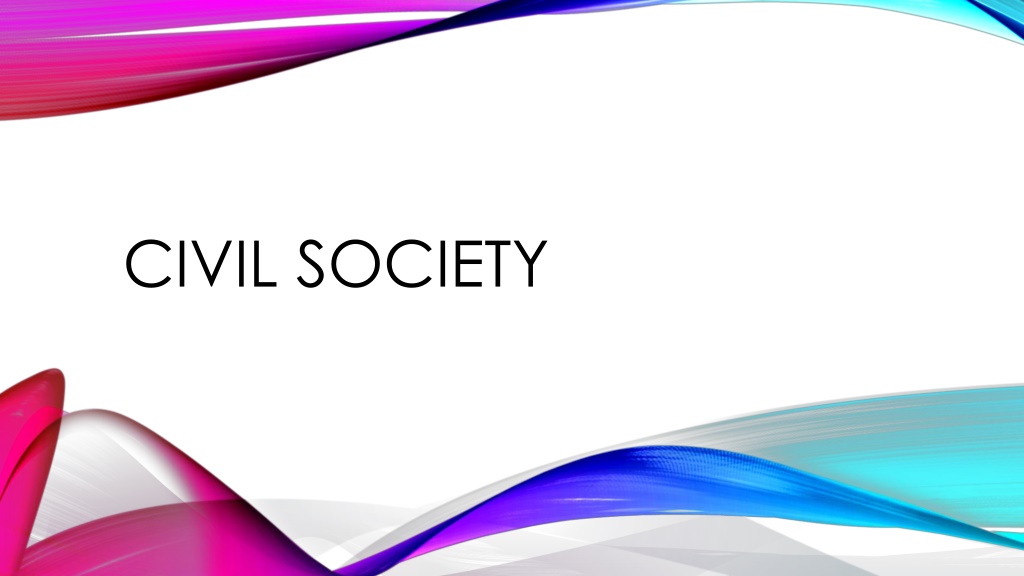

![❤[PDF]⚡ Civil War Talks: Further Reminiscences of George S. Bernard and His Fel](/thumb/20551/pdf-civil-war-talks-further-reminiscences-of-george-s-bernard-and-his-fel.jpg)
